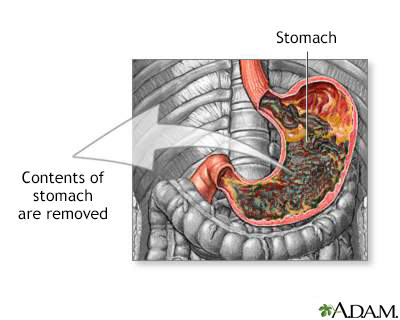Gastric suction
Gastric lavage; Stomach pumping; Nasogastric tube suction; Bowel obstruction - suction
Gastric suction is a procedure to empty the contents of your stomach.

Gastric suction is perform to empty the contents of the stomach before it passes through the rest of the digestive tract.
How the Test is Performed
A tube is inserted through your nose or mouth, down the food pipe (esophagus), and into the stomach. Your throat may be numbed with medicine to reduce irritation and gagging caused by the tube.
Stomach contents can be removed using suction right away or after irrigating water through the tube.
How to Prepare for the Test
In an emergency, such as when a person has swallowed poison or is vomiting blood, no preparation is needed for gastric suction.
If gastric suction is being done for testing, your health care provider may ask you not to eat overnight or to stop taking certain medicines.
How the Test will Feel
You may feel a gagging sensation as the tube is passed.
Why the Test is Performed
This test may be done to:
- Remove poisons, harmful materials, blood, or excess medicines from the stomach
- Clean the stomach before an upper endoscopy (EGD) if you have been vomiting blood
- Collect stomach acid
- Relieve pressure if you have a blockage in the intestines
- Stop frequent vomiting
Risks
Risks may include:
- Breathing in contents from the stomach (this is called aspiration)
- Hole (perforation) in the esophagus
- Placing the tube into the airway (windpipe) instead of the esophagus
- Minor bleeding, including a nosebleed
- Electrolyte imbalance
References
Holstege CP, Borek HA. Decontamination of the poisoned patient. In: Roberts JR, Custalow CB, Thomsen TW, eds. Roberts and Hedges' Clinical Procedures in Emergency Medicine and Acute Care. 7th ed. Philadelphia, PA: Elsevier; 2019:chap 42.
Meehan TJ. Care of the poisoned patient. In: Walls RM, ed. Rosen's Emergency Medicine: Concepts and Clinical Practice. 10th ed. Philadelphia, PA: Elsevier; 2023:chap 135.
Wang KK. Gastrointestinal endoscopy. In: Goldman L, Cooney KA, eds. Goldman-Cecil Medicine. 27th ed. Philadelphia, PA: Elsevier; 2024:chap 120.
Version Info
Last reviewed on: 9/30/2024
Reviewed by: Jonas DeMuro, MD, Diplomate of the American Board of Surgery with added Qualifications in Surgical Critical Care, Assistant Professor of Surgery, Renaissance School of Medicine, Stony Brook, NY. Review provided by VeriMed Healthcare Network. Also reviewed by David C. Dugdale, MD, Medical Director, Brenda Conaway, Editorial Director, and the A.D.A.M. Editorial team.
